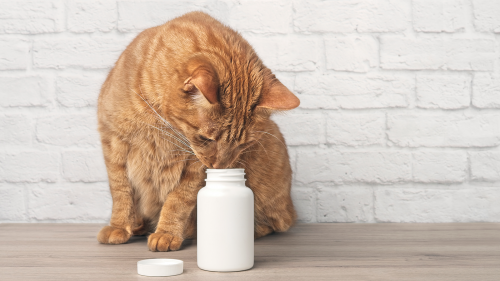If you’ve ever had to give your cat a dose of medicine, you know that it can go sideways quickly. While no cat enjoys the process, some might be more cooperative depending on how the drug is given. For example, some cats tolerate taking pills easier than liquid, while others make the pill-giving process into a battle royale.
Thankfully, your veterinarian can ask a compounding pharmacist to change that FDA-approved pill into a liquid for your finicky feline.
Some common instances where veterinarians may recommend compounding are:
- Creating an oral medication from tablets or injectable solutions
- Adding flavoring
- Mixing solutions into eardrops
- Reformulating a medication to remove a harmful ingredient (such as an allergen)
FDA’s Role in Compounded Animal Drugs
The FDA is charged with evaluating animal drugs to make sure they are safe & do what they claim to do, whether that’s treating a particular type of infection, relieving pain, or treating some other problem.
When evaluating an animal drug for FDA-approval, scientists (including veterinarians) examine the dose, what species or type of animal it’s meant for, & how that animal processes the medicine in the body. If the medicine is used in animals that produce food, like meat, milk or eggs, the FDA also checks whether it’s safe for people to eat food from an animal treated with the medicine. Compounded animal drugs, on the other hand, are not FDA-approved.
Obviously, an FDA-approved drug is the gold standard – not only has the agency found it to be safe & effective, but FDA experts have also looked at the way it’s being manufactured & inspected the facility where it’s being made. The FDA also pores over the proposed label, making sure the directions for how to use the drug are clear & account for any known side effects. This isn’t true for compounded animal drugs.
After a drug is approved, the FDA continues to monitor the drug & address any problems that come to light after it’s used in the general animal population & gather more information than could be included in a clinical study. Drug companies are also required to report to the FDA any complaints they receive about the drug, whether it’s an unexpected outcome or a packaging issue. Compounders of animal drugs don’t have the same reporting requirements, which makes it hard for the FDA to track the safety record of these products.
But at the same time, there isn’t an approved animal drug for every disease or condition in every species. For example, there aren’t many approved animal drugs for animals like chinchillas or other so-called “pocket pets,” nor for wildlife or zoo animals. &, as any veterinarian knows from trying to give a pill to a stubborn cat, no medicine will work if you can’t get it into the patient.
Some workarounds have always been legal under FDA regulations, such as using an FDA-approved drug as the starting point for a compounded drug. To help vets have the tools they need to treat all the animals in their care, the FDA has addressed veterinarians’ access to compounded drugs when starting from what’s called “bulk drug substances” – essentially making a medicine from scratch.
Your Pet & Compounded Veterinary Drugs
If your pet is using a compounded drug made from a bulk drug substance, it’s not an FDA-approved drug. But, in situations where there are no FDA-approved drugs that are appropriate for a pet’s treatment, veterinarians choose to use what’s best for the patient. That’s why your veterinarian may decide to prescribe a compounded animal drug for your pet.
Additionally, under certain circumstances, your veterinarian might keep select compounded products in inventory, meaning they aren’t developed with a particular patient in mind, but instead are medicines the veterinarian needs to keep on hand for immediate or emergency use. The drugs selected to keep in inventory should be from a list of compounded animal drugs that the FDA maintains & updates with input from the veterinary community.
The FDA, working with the veterinary community, has gathered published scientific evidence on some of the most-used bulk drug substances & initiated lists of those that are needed for emergency situations so that veterinarians won’t see any delay in using these urgently-needed drugs to treat their patients. We encourage veterinarians & compounding pharmacists to continue to work with FDA to nominate additional bulk drug substances so we can continue to expand the list of compounded drugs needed for emergency or immediate use.
The FDA believes in both flexibility & supporting animal health, but also wants to make sure that the medicines that veterinarians have on hand are safe. In the end, it’s better for everyone, especially the animals!
Reporting Adverse Events
Manufacturers of FDA-approved drugs have to share with the FDA any complaints they receive. Compounding pharmacies are encouraged – but not required – to report problems with compounded animal drugs to the agency. The FDA encourages veterinarians & animal owners to report adverse events associated with any drugs used in animals.
- Download the fillable 1932a electronic form to your computer & email the completed form to [email protected].
- You should also report the problem to the manufacturer or distributor shown on the label & to the store where you purchased the product.
For questions about ADE reporting or to request a hard copy of the form, please contact CVM at [email protected], 1-888-FDA-VETS (1-888-332-8387), or by mail:
Center for Veterinary Medicine
Food & Drug Administration
HFV-1
7500 Standish Place
Rockville, MD 20855
Source: FDA Consumer Updates

